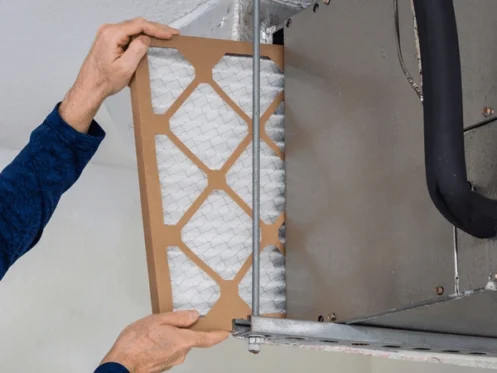Maintaining good indoor air quality is crucial for creating a healthy home environment. With the increasing amount of time spent indoors, ensuring that the air we breathe is clean and free from pollutants has never been more important. One of the key components in protecting air quality is the air filter. Regular air filter change is important in keeping indoor air fresh and healthy. For more information on maintaining indoor air quality, visit our Indoor Air Quality page.
In this article, we will explore the importance of changing air filters and how it impacts air quality and system efficiency. We’ll look into the details of HEPA air filters, discover the technology behind clean light air purifiers, and provide a step-by-step guide on how to clean air conditioner filters. Additionally, we’ll discuss the environmental impact of air filters and how eco-friendly habits can help reduce waste.
Why Air Filter Change is Essential
Changing your air filter regularly is essential for several reasons:
- Improved Air Quality: Air filters trap dust, pollen, and other airborne particles, preventing them from circulating in your home. A clean filter ensures that these particles are effectively captured, leading to cleaner air.
- System Efficiency: When air filters are clogged, your HVAC system has to work harder to circulate air, which can lead to increased energy consumption and higher utility bills. Keeping filters clean helps your system run smoothly and efficiently.
- Longer Equipment Life: Clean filters reduce the strain on your HVAC system, potentially extending its lifespan and preventing costly repairs.
For more detailed information on the benefits of maintaining air filters, visit The Importance of Air Filter Maintenance – Brody Pennell.
Understanding HEPA Air Filters
HEPA air filters are a crucial component in maintaining better indoor air quality. But what exactly are they? HEPA stands for High-Efficiency Particulate Air. These filters are designed to capture at least 99.97% of airborne particles as small as 0.3 microns. This includes dust, pollen, mold spores, and even some bacteria and viruses.
Unlike standard filters, HEPA filters are made of tightly packed fibers that trap tiny particles more effectively. This makes them particularly beneficial for individuals with allergies or respiratory conditions, as they help to greatly lower indoor pollutants.
- Effectiveness: HEPA filters capture small particles that standard filters might miss.
- Health Benefits: By reducing airborne contaminants, they contribute to a healthier indoor environment.
- Applications: Commonly used in homes, hospitals, and laboratories for their superior filtration capabilities.
Clean Light Air Purifier: How It Works
Clean light air purifiers are becoming popular for their new way to enhancing air quality. These devices utilize advanced technology to cleanse the air efficiently.
The core technology involves the use of ultraviolet (UV) light, which helps to neutralize airborne pathogens. As air passes through the purifier, the UV light disrupts the DNA of bacteria and viruses, rendering them harmless. This process not only improves air quality but also helps in reducing the spread of illnesses.
For more detailed insights into how air purifiers work and their health benefits, you can refer to this comprehensive guide on air purifiers.
- UV Technology: Uses ultraviolet light to eliminate harmful microorganisms.
- Air Quality Improvement: Reduces allergens, bacteria, and viruses in the air.
- Health Benefits: Contributes to a cleaner and healthier indoor environment.
Clean light air purifiers are an excellent addition to any home, especially for those looking to enhance their indoor air quality effectively.
How to Clean Air Conditioner Filter
Keeping your air conditioner filter clean is essential for maintaining best performance and ensuring the air in your home remains fresh and healthy. A clean filter helps your HVAC system run more efficiently, saving energy and extending the lifespan of your unit. Follow these simple steps to clean your air conditioner filter:
- Turn Off the Power: Before you begin, make sure your air conditioner is off to avoid accidents.
- Locate the Filter: Open the front panel of your air conditioner to access the filter. This is usually located near the return air duct.
- Remove the Filter: Carefully slide out the filter. Take note of how it fits, so you can easily replace it later.
- Check the Filter: Check for any visible dirt or damage. If the filter looks worn out, it might be time to replace it.
- Clean the Filter: Use a vacuum cleaner with a brush attachment to remove dust and debris. For a deeper clean, rinse the filter with lukewarm water. Avoid using soap, as it may leave residue.
- Dry the Filter: Allow the filter to air dry completely before reinserting it. This prevents mold and mildew growth.
- Reinstall the Filter: Once dry, slide the filter back into its original position and secure the front panel.
Frequency of Cleaning: It’s recommended to clean your air conditioner filter every 1-3 months, depending on usage and environmental factors. If you notice reduced airflow or increased dust in your home, it may be time to clean the filter. For more tips on maintaining your air conditioner, visit our Air Conditioner Maintenance page.
Environmental Impact of Air Filters
While air filters play a crucial role in maintaining indoor air quality, they also add to waste. Most filters are disposable and need regular replacement, which can add up over time. Here are some eco-friendly habits to minimize waste:
- Choose Reusable Filters: Consider investing in washable and reusable filters. These can be cleaned and reused multiple times, reducing waste.
- Recycle Used Filters: Check with local recycling programs to see if they accept used filters. Some manufacturers also offer recycling programs.
- Opt for Eco-Friendly Options: Look for air filters made from sustainable materials or those that have a smaller environmental footprint.
- Regular Maintenance: Keeping your HVAC system well-maintained can extend the life of your filters, cutting down on how often you replace them. Consider our Duct Cleaning services to further enhance your system’s efficiency.
For more insights on the environmental impact of air filters and how to reduce waste, visit this resource.
Ensuring Optimal Indoor Air Quality with Quality Cooling & Heating
Maintaining optimal indoor air quality is crucial for a comfortable and healthy home. Regular air filter changes play a big role in achieving this goal. Here’s a quick recap of what we’ve covered:
- Regular air filter changes help keep the air clean and your system running smoothly.
- HEPA air filters are highly effective in trapping small particles, enhancing indoor air quality.
- Clean light air purifiers use advanced technology to provide cleaner air.
- Knowing how to clean air conditioner filters can maintain optimal performance and efficiency.
- Being mindful of the environmental impact of air filters can lead to more eco-friendly habits.
For residents in the Greater Austin area and Abilene, Quality Cooling & Heating offers reliable HVAC services to help maintain a healthy home environment. From air conditioning and heating system installations to emergency services and plumbing, our team is focused on keeping your home comfortable and safe. Think about setting up regular maintenance with us to keep your air quality at its best. Visit our website to learn more about our services.


